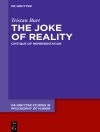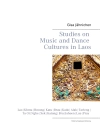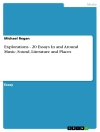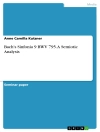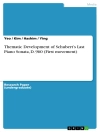In ‘Parsifal, ‘ the anthology presents a profound exploration of mystical themes, delving into the realms of spirituality, purity, and enlightenment. The collection spans an array of literary styles, incorporating lyrical poetry, intricate prose, and dramatic narratives that reflect the rich tapestry of human experiences. Amidst these diverse voices, certain pieces stand out for their evocative and transformative qualities, illuminating the timeless quest for redemption and inner peace. The anthology draws upon a literary context steeped in philosophical and theological reflection, offering readers an engaging and multifaceted experience. The contributors, Richard Wagner and Oliver Huckel, bring their distinct cultural and intellectual backgrounds to the anthology, enhancing its thematic cohesion. Wagner’s renowned operatic genius offers a compelling foundation of mythic and symbolic narratives, while Huckel’s translation and interpretive flair situate these works within a broader literary and spiritual landscape. Together, they bridge the literary movement of Romanticism with existential inquiry, providing a continuum that reflects the ethos and aspirations of the late 19th and early 20th centuries. Their collective contributions invite readers to ponder the convergence of music, literature, and spirituality. This anthology beckons readers to immerse themselves in a rich dialogue of ideas and narratives that transcend temporal boundaries. By traversing varied perspectives and literary traditions, ‘Parsifal’ offers an expansive educational experience, granting insight into humanity’s eternal search for meaning. It challenges and enthralls, making it an indispensable acquisition for those yearning for a deeper understanding of the spiritual and the sublime. As such, this work is recommended not only for its artistic merit but also for its ability to provoke thought and inspire transformative reflection.
Об авторе
Richard Wagner (1813–1883) was a revolutionary figure in the world of opera and music drama, most renowned for his comprehensive and intricate operatic compositions which synthesized music, poetry, and stagecraft into a harmonious whole. His literary flair was not secondary to his musical genius; indeed, Wagner considered himself as much a poet-playwright as a composer. Amongst his monumental works is ‘Parsifal’, his final opera, which premiered in 1882. Not merely an operatic masterpiece, ‘Parsifal’ serves as an embodiment of Wagner’s mature artistic and philosophical musings, delving into the themes of redemption and spiritual resurrection through the eponymous character’s journey, drawn from medieval Grail legends and inspired by Wolfram von Eschenbach’s Middle High German epic poem ‘Parzival’. Wagner’s profound impact on music and literature extends beyond his operas, influencing various domains of art, philosophy, and culture. His innovative use of leitmotifs and his conceptualization of the Gesamtkunstwerk (‘total work of art’) are a testament to his visionary approach to art, where every element serves the purpose of narrative and emotional expression. Wagner’s legacy persists, not only in the world of opera but also in the broader landscape of Western classical music, leaving an indelible mark on subsequent generations of composers and writers.


